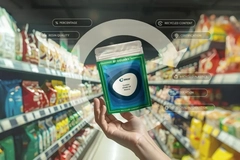Ball and CavinKare roll out aluminum cans for RTD milkshakes in India
03 Jun 2024 --- Ball Corporation and Cavinkare have unveiled retort aluminum cans designed for milkshakes, catering to the growing demand in India for convenient, ready-to-drink (RTD) beverages with a sustainability element.
The new cans will feature across Cavinkare milkshake flavors like Badam, Gulkhand, Rajbog and Rabri. The partnership highlights the RTD market in India is projected to see a compound annual growth rate (CAGR) of 4.1% by 2028, driven by consumers’ desire for convenience and flavor variety.
“Our focus on the RTD segment, bolstered by unique flavor offerings, aligns with the dynamic consumer preferences and the segment’s faster growth trajectory,” says Manish Joshi, commercial director at Ball Beverage Packaging Asia.

 RTD milkshake cans (Image credit: CavinKare).Stable preservation
RTD milkshake cans (Image credit: CavinKare).Stable preservation
Ball Corporation’s investment in retort aluminum can production ensures the packaging withstands the sterilization process, preserving the milkshakes’ flavor, nutrients and freshness.
“We are thrilled to embark on this journey toward sustainable packaging options,” comments Mallikeswaran KG, business head of the Beverages Division at Cavinkare.
“Transitioning to aluminum cans not only aligns with our commitment to superior product quality but also significantly reduces our environmental impact.”
Lightweight aluminum’s advantages over traditional packaging include minimizing transportation costs while protecting against light and oxygen.
“Our move to aluminum cans reflects our dedication to responsible environmental practices,” says Mallikeswaran. “We are committed to progressing toward 100% sustainable packaging, maintaining our leadership in eco-conscious innovation.”
Aluminum in the news
In recent activities, Ball equipped Carlsberg with lightweight beverage cans to cut 5,000 metric tons of CO2 annually.
Aluminum industry stakeholders have set an ambitious target of achieving a near 100% recycling rate for drink cans by 2050 at COP28 in Dubai, UAE. The initiative supported the International Energy Agency’s “Net Zero 2050” goal and addressed the need for enhanced recycling to combat climate change.
By Benjamin Ferrer













